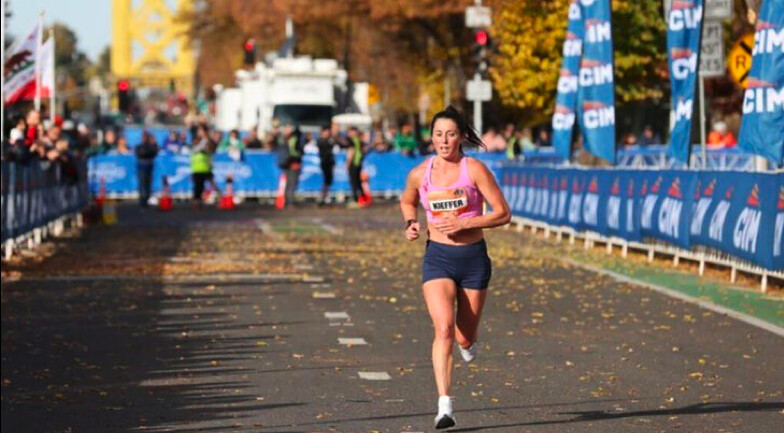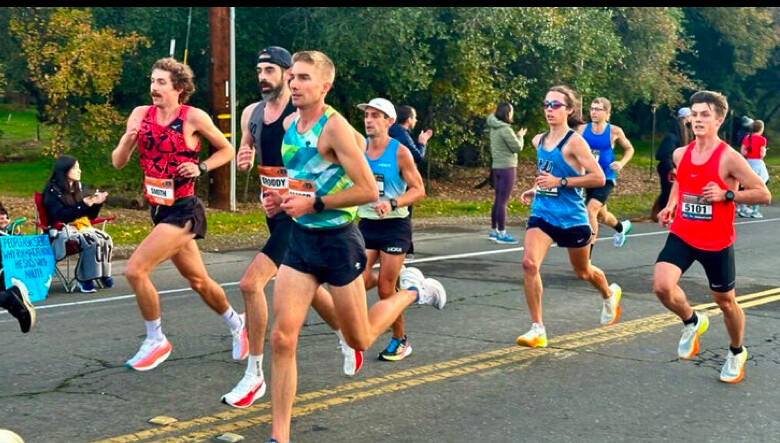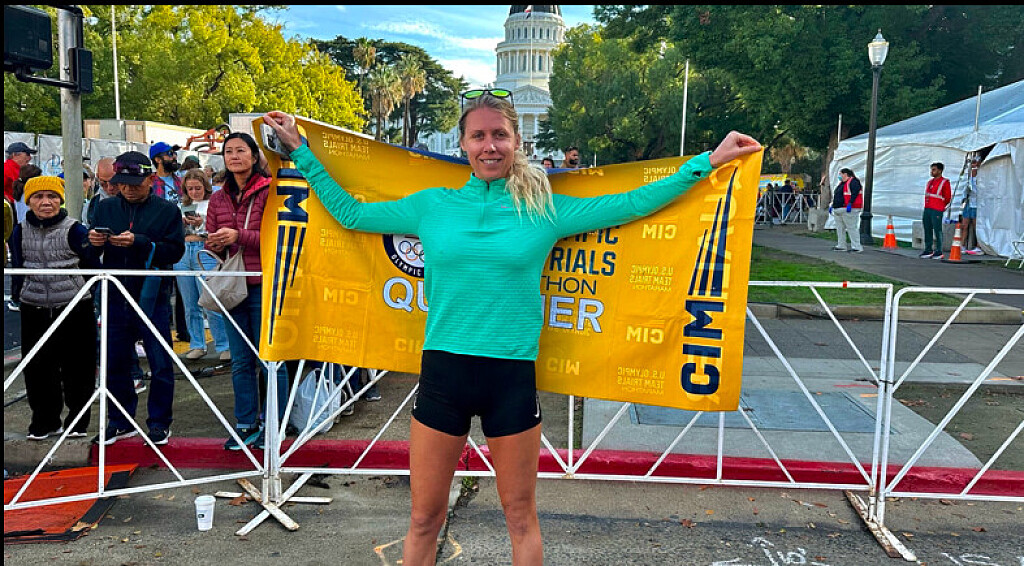Running News Daily
Running News Daily is edited by Bob Anderson. Send your news items to bob@mybestruns.com Advertising opportunities available. Train the Kenyan Way at KATA Kenya and Portugal owned and operated by Bob Anderson. Be sure to catch our movie A Long Run the movie KATA Running Camps and KATA Potato Farms - 31 now open in Kenya! https://kata.ke/
Index to Daily Posts · Sign Up For Updates · Run The World Feed
A Marathon Where Victory Isn’t Reserved for the Winners
CJ Albertson and Grace Kahura-Malang won the California International Marathon while dozens more fulfilled lifelong dreams to qualify for the U.S. Olympic Trials in their last chance
If there’s one race where the adage ‘To the victor go the spoils” does not ring entirely true, it’s the California International Marathon (CIM). The commanding wins of CJ Albertson and Grace Kahura-Malang were certainly deserving of celebration. But they shared in the sweet taste of victory with dozens more high-level runners on last Sunday morning.


For several minutes after Albertson stormed from behind to take the men’s race in 2:11:09 and Kahura broke the tape in the women’s race with a personal best of 2:29:00, the finish line exhilaration continued to build as numerous runners sprinted their way to the finish line on M Street, adjacent to the California Capitol Mall in downtown Sacramento.
That’s because the winning prizes extended far beyond the $10,000 to something money can’t buy. American runners who could get to the finish line in time earned a qualifying berth for the 2024 U.S. Olympic Trials Marathon on February 3 in Orlando, Florida. That event will determine the six U.S. runners who will compete in next summer’s Paris Olympics, but it’s also a quadrennial benchmark of domestic distance running excellence, and the chance to run in it—especially for those who have no chance at making the Olympic team—is a badge of honor that lasts a lifetime.
Sunday’s CIM was the last opportunity to grab that proverbial brass ring, and as the time ticked down to the cutoffs—2:18 for men and 2:37 for women—41 runners realized dreams that had been several years in the making. That’s a considerably smaller number than the 109 runners who qualified four years ago, but the Olympic Trials are four weeks earlier this time around and many runners opted for earlier races.
To reach the lofty Olympic Trials qualifying (OTQ) standards, many runners had to face their inner demons as they accepted the physical, mental, and emotional challenge of running 26.2 miles faster than they ever have.
“It was very hard-fought,” said Mary Denholm, a Colorado runner who lowered her personal best by more than four and half minutes to finish in 2:36:28 and earned the OTQ time. “During the race, I tried to think as little as possible, but you know those little negative thoughts creep in. I kept saying to myself, Well, you’d be happy with a 2:37 or a 2:38, which is true, but I had to not allow myself to accept that and slow down. Marathoning is so hard. It’s a process. You really have to love the journey.”
Celebrating its 40th year, CIM has developed a reputation as one of the best domestic races for elite and age-group runners seeking personal best efforts, whether that’s chasing an OTQ or Boston Marathon-qualifying time. The race’s point-to-point, net-downhill 26.2-mile course from Folsom to Sacramento amid Northern California’s typically favorably cool, dry early December weather is ideal for running fast for any of the 10,000 participants. But what makes fast times more likely is the communal effort of the large packs of runners at nearly every pace group.
With the Trials-qualifying deadline of December 5 looming, about 200 American runners lined up at CIM to specifically chase the 2024 OTQ marks. While a few have been training with the aid of sponsorships or trying to become professional runners, the majority were amateur runners who work full-time jobs.
For some—like first-time marathoners and twenty-somethings Charlie Sweeney, Christian Allen, Ava Nuttall, and Abbie McNulty—it was the initial opportunity to meet the mark. But it wasn’t the first rodeo for many others who were back after coming up short in previous years, including thirty-somethings Denholm, Noah Droddy, Allie Kiefer, and Chad Beyer. For some who are slowing with age, or on the verge of hanging up their racing shoes for bigger career pursuits, CIM might have been the final shot of their competitive running careers.
In the moments before the race in Folsom, the nervous energy of every elite runner was palpable as they did their final pre-race strides and stretches, each one carrying with them their own long backstory that brought them to the brink of their dreams. After a brief moment of calm on the starting line, the gun went off and the enticing challenge began.
“This was my shot,” said Droddy, a 33-year-old Salomon-sponsored pro from Boulder, Colorado, who had a breakthrough 2:09:09 runner-up performance at The Marathon Project in 2020 but, because of a variety of injuries, hadn’t finished a marathon since. “I qualified on the last day in 2016, and so this was another full-circle moment to try to do it on the last day again.”
For the next two-plus hours, every runner locked into the silent rhythm of their race pace—each with their own goal in mind—holding onto the cadence of the random runners nearby. This is all the while knowing that consistent effort would gradually transition from being smooth and tolerable to eventually becoming extremely difficult by the later miles of the race.
Allen, a marathon rookie from Salt Lake City eager to make his mark, boldly opted to run off the front from the start with New Zealand’s Matt Baxter and Kenyan Milton Rotich, while Albertson, a Fresno-based runner who has been one of the most consistent elite-level marathoners in the U.S. for the past several years, looked calm and content as he ran just off the lead near the front pack.
While many OTQ-seeking American women grouped together in the quest for a 2:33 to 2:37 finish, Kahura-Malang, a 30-year-old Kenyan runner who lives near Boulder, started quickly and tagged along with a much-faster group of men with hopes of breaking 2:30 for the first time.
“I really didn’t know how far I was from the other women, but I didn’t want to focus on that,” she said. “I just wanted to keep running fast.”
Achieving success in a marathon can be a fickle task—one that relies on equal parts sufficient training, optimal fueling, and mental tenacity. But the magic of an elite-level marathon, especially CIM during a pre-Olympic Trials year, can be tied to finding confidence running amid the collective rhythm of a pack of like-minded runners, at least until things get difficult at the crux of the race somewhere near mile 20.
Maintaining race pace and grinding through the final miles is something every runner experiences, each one to varying success. That’s where inspirational mantras, acknowledging motivational words written on an arm, or a variety of other mental tricks come into play.
“We had a great group for a while, and then about 20 miles, it started to thin out,” said Jacob Shiohira, 27, from Bentonville, Arkansas. He sliced seven minutes off his personal best with his 13th-place, 2:16:34 finish to make the OTQ cut. “The last three miles turned into a grind, but everyone’s in the same boat, and that’s what makes it special.”
The 26-year-old Allen, fresh off finishing an All-American track and cross country collegiate career at Brigham Young University, spent the summer racing shorter distances on roads and trails. He stuck with his gutsy strategy to lead the race until his legs began to tighten up at the 23-mile mark. Albertson had let Allen and Rotich get ahead of him on a few of the later hills in the race but patiently stayed within himself and seized the lead late in the race to open up a two-minute advantage before the finish.
Rotich finished two minutes after Albertson in 2:13:04 for second, followed by Charlie Sweeney, a 24-year-old runner from Boulder, who completed a stunning debut marathon with a third-place, 2:13:41 finish to earn the Olympic Trials-qualifying standard. After that, Baxter, a Kiwi runner who runs for NAZ Elite, put down a new personal best of 2:14:08, followed by Eritrea’s Amanuel Mesel (2:14:11). From there, Robert Miranda (2:14:43), Jerod Broadbooks (2:14:58) and Allen (2:15:01) led a parade of 27 American men who celebrated securing their OTQ times.
Droddy made it too, finishing 17th in 2:16:56, to earn one of the celebratory golden OTQ flags CIM handed out to each of the qualifiers.
“I didn’t care about the time at all, just as long as it was under 2:18,” said Droddy, who also qualified in 2016 and 2020. “I was just happy to get it done. It means a lot because now I know I can join my teammates at the Olympic Trials.”
More than four minutes after Kahura-Malang ran away with the women’s title, Kiefer (2:33:26) led the charge of a long string of American women who cruised in under the OTQ cutoff. Once a top American runner, the 36-year-old from Austin, Texas, hadn’t finished a marathon since she placed seventh in New York in 2018. Like a lot of runners, she’s been through a lot of challenges in recent years, including injuries, races she’s dropped out of (including the 2020 U.S. Olympic Trials in Atlanta), relocating to new cities, changing coaches, and general motivation.
“I’m back to the basics of having fun with it,” Kiefer said. “There’s no pressure right now. I just wanted to have a good experience, and it was a great experience. It feels validating to get back to the Trials. It’s just nice to go out there and do the part you love.”
Nuttall, 22, was perhaps one of the positive surprises of the day. A senior at Miami University in Ohio, where she was the top cross country runner for the Redhawks this fall, she finished her debut marathon in third place in 2:35:09. After that it was Kaylee Flanagan, 28 who earned her first OTQ with a strong 2:35:24 effort to join her older sister and Asics pro Lindsay Flanagan in Orlando. After that it was professional trail runners Rachel Drake (2:35:28) and Peyton Thomas (2:35:42), who finished fifth, and sixth, respectively. (Drake is also the mother to 14-month-old son, Lewis.)
Nine more women earned the OTQ time—14 total—including Denholm, who finished 13th in 2:36:28.
But amid the joy of dreams coming true, there was also the heartbreak of near-misses. Tammy Hsieh sprinted to the finish just in the nick of time, crossing in exactly 2:37:00 to make the women’s cut, but moments later Gina Rouse (2:37:10) and Jennifer Sandoval (2:37:11) narrowly missed it and went home disappointed.
On the men’s side, Duriel Hardy dashed across the line in 2:17:56 to become the final men’s OTQ’er, but then Alexander Helmuth came across the line two seconds too late in 2:18:02.
After a record 511 women qualified for the 2020 U.S. Olympic Trials Marathon in Atlanta—nearly double the number of male qualifiers—the women’s standard was lowered by eight minutes, down from 2:45 to 2:37. The new mark equates to a hefty 18 seconds per mile faster, down from 6:18 minute mile pace to 6 minutes flat. Denholm, who qualified in 2020 with a 2:42:02 effort at the 2019 CIM, was one of hundreds of women who spent the past several years trying to make that big leap.
After running a personal best of 2:40:59 at the 2022 Boston Marathon, Denholm hoped to continue her progression and earn her qualifying time months ago. But the marathon is a fickle event because training never goes perfectly and something—injuries, work, life—always gets in the way. And sometimes everything goes right and it’s just not your day on race day.
After dealing with a torn labrum and then going through a divorce, career changes, and a move from California to Colorado, the 36-year-old running coach targeted last summer’s Grandma’s Marathon in Duluth, Minnesota—another domestic race on par with CIM when it comes to providing a competitive platform for elite and sub-elite runners to excel.
But despite a good training block, Denholm struggled in that race and finished in 2:43:19. After that, she refocused her training with the help of coach and three-time OTQer Neely Gracey and set her sights on the September 24 Berlin Marathon, only to come down with COVID after she arrived in Germany. Not wanting to give up, she retooled her training one more time and registered for CIM as a last-ditch effort.
She was on 2:36 pace the entire way, running near-identical 13.1-mile splits of 1:18:17 and 1:18:11, but needed the encouragement of friend, Sofie Schunk, to get her through the final miles. Schunk, 31, of Albuquerque, finished six seconds ahead of her in 2:36:22.
“I went to a really dark place out there and had to fight through that,” she said. “It was awesome to have other women out there to go for it with and encourage along the way. I split some of my faster miles near the end, and I’ve never been able to do that, so that was a huge victory for me. I hope this can be encouraging to other women because I really think everyone is limitless. I’ve just worked really hard to get where I am and I just want others to feel encouraged.”
by Outside Online
Login to leave a comment




